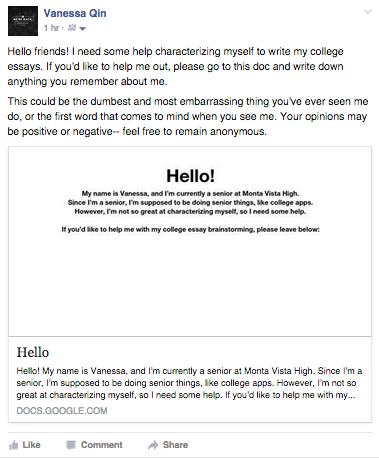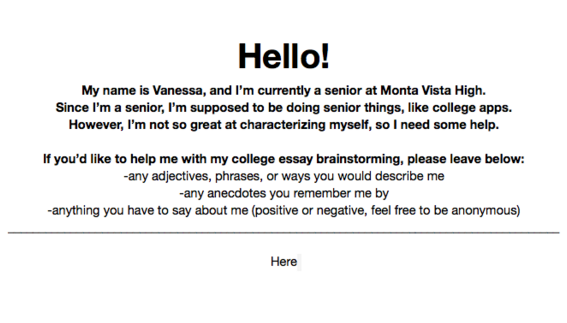ith college apps season rolling around (and rolling me over), I figured it was about time I get started on my apps. Of course, with the apps come the strenuous and well-emphasized personal statements and “Why this school?” essays.
A friend of mine who graduated from MVHS in 2015 left me with two valuable pieces of advice in regards to college essays—first was for the “Why this school?” essays: if you can replace the name of the school with “Disneyland” in your essay, then your essay’s not unique enough. Sorry. The second piece of advice was: if you’re thinking of ways to describe yourself to colleges and you feel uncomfortable bragging about yourself, think about how others would describe you instead.

So, I presented my friends (my Facebook “friends”) with a simple request: describe me the way they see me.
I didn’t expect anyone to participate in my experiment of sorts, but, surprisingly, people actually responded. Whether their responses were warranted or not is something else.
HOW IT WENT DOWN
I’m in my room, it’s a typical Thursday night, I’m listening to the type of music I really like, and I thought I’d never know my stories like others do.
I decided to start brainstorming for my dreaded personal statement, and quickly came to an idea generator’s block. I’ve never derived any profound epiphanies from a childhood play-time event, experienced a tragic medical incident, or grew up with divorced parents. How could I write a story that would make me seem special?
So, I stopped and tried to think of myself from an outsider’s perspective.
I created a google doc and posted it on Facebook asking for people to characterize me to help me continue my brainstorm. After posting the doc, I closed the tab and thought to myself, “alright, just don’t check back for another hour and see what happens.”
Approximately three minutes and eight seconds later, I got a Facebook message regarding my doc.
“Holy sh** what happened to your doc? I was on mobile and that picture scared the sh** out of me.”
WHAT I DID
I reluctantly and skeptically opened a fresh tab and pulled up my doc.
The first thing I saw was not my welcoming “Hello!” message written in Helvetica bold, but rather a photo of a dead woman’s face infested with maggots. Okay, I scrolled a little further, and saw a few decapitated people and some phallic graphics (but for the purposes of protecting your mental stability and sleep tonight, I will not be disclosing these photos.)
I thought to myself, “Well this is the internet and trolls are inevitable. I’m just going to leave the doc up for a little while and see what happens.”
A few minutes pass. A few more notifications popped up through Facebook, iMessage, snapchat, and twitter. My sister shouted to me from her room across the hall, “WOAH, maybe you should take down your doc. People are being really rude.”
Essentially, people were writing absurdities, telling racist jokes, and instructing me to kill myself.
There was one kind person who wished me good luck on getting into “UC De Anza.”
Quite frankly, it was kind of entertaining. So I sat and watched.
[embedyt] http://www.youtube.com/watch?v=UvBs86nfRxM[/embedyt]
About half an hour after the maggot-face woman image was deleted by another anonymous person, the kind folk of the internet made an appearance. Although people were still telling me this was a bad idea, a few others tried their best to provide support. (Thanks anonymous, I think you’re nice, cool, friendly too!)
Eventually, the macabre images stopped coming and instead people just used my doc to create random abstractions like grids and indecipherable graphic drawings. The occasional person would pop up and try to write a few adjectives to describe me, only to have them immediately deleted and replaced with a black checkerboard.
CONCLUDING THOUGHTS
I watched the power of anonymity unfold in front of my eyes through my 13-inch retina display, and got a lot of mixed skepticism and support.
We are able to use a screen as a shield and a scapegoat to say what is normally deemed socially unacceptable. The thoughts we convey through pixels don’t always match up with the words we voice in person; they seem temporary. But, they are not. We often forget that the impact of what we say through our screens is permanent.
Most of the opinions of these people were negative, or completely irrelevant. The popular #nofilter hashtag is pervasive in sarcastic comments and joking photo captions, but we’ve replaced verbal filters with laptop, tablet and smartphone screens without warrant.
the Dark Web, or TORAnonymity gives voice to the tangential, persecuted, and stigmatized. It eliminates the fear factor that withholds us from speaking the unspoken and acting upon the unthinkable. We see faceless figures across the internet in countless profiles and the underground of the internet: Reddit,
(a super anonymous and super sketchy collection of websites) and a faceless identity only empowers people to contribute more to the growing stunt that inhibits us from acting as real people.
We act as robots hidden behind faceless grey silhouettes and deal with our discontent through childish remarks posted on a forum or comment thread. This power is an inhibitor—it prevents us from dealing with interpersonal relations and provides us with none other than an excuse to contribute to the antagonistic mindset of our generation.
Though it is important to keep others’ perspectives in mind, if others are speaking without a filter, we should still filter in what is and is not valid for ourselves. We can’t control what others will say when their identities are masked by a faceless silhouette, but we can control what we take heed of.
So yes, it’s hard to write a story that describes the essence of your entire existence in 650 words or less. It seems impossible to paint a single picture of yourself when there are so many versions of you known to others. When I’m writing my personal statement, I want to write a story that will resonate with whoever is reading it, whether it be a college admissions counselor or a peer. The best way to do so is to be honest with yourself; consider the personayou project and balance it with the persona you want others to see.











